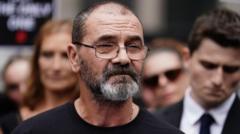Is the New Payout Cap for Wrongly Jailed Individuals an Insult? Malkinson Weighs In

Understanding the Impact of Miscarriages of Justice and the Need for Fair Compensation
In recent years, the issue of miscarriages of justice has gained significant attention, particularly in relation to the compensation received by those wrongfully convicted. The case of Andrew Malkinson, who spent 17 years in prison for a crime he did not commit, highlights the ongoing struggles faced by victims of judicial errors. With the recent announcement from the Ministry of Justice (MoJ) regarding an increase in the cap on compensation payouts, many are questioning whether this change is sufficient to address the deep-seated issues surrounding wrongful convictions. This article aims to explore the implications of such changes, the experience of wrongfully convicted individuals, and the broader context of justice reform.
The Case of Andrew Malkinson
Andrew Malkinson’s case is a stark reminder of the potential for grave errors within the criminal justice system. Wrongfully convicted in 2003 for a crime he did not commit, Malkinson’s life was irrevocably altered during his nearly two decades in prison. His experiences of psychological and physical trauma raise essential questions about the responsibilities of the state and the adequacy of compensation mechanisms for those wrongfully imprisoned.
Background of Malkinson’s Conviction
In 2003, Andrew Malkinson was convicted of the rape and assault of a woman in Manchester. The conviction was based largely on flawed forensic evidence and witness testimonies that later proved to be unreliable. After years of legal battles, Malkinson was finally exonerated in July 2023, leading to widespread media coverage and public outrage over the miscarriage of justice.
The Psychological Toll of Wrongful Conviction
Beyond the loss of freedom, individuals like Malkinson often experience profound psychological effects, including:
- Post-Traumatic Stress Disorder (PTSD): Many wrongfully convicted individuals suffer from PTSD due to their traumatic experiences in prison.
- Depression and Anxiety: The long-term emotional impact can lead to chronic depression and anxiety, making reintegration into society challenging.
- Social Isolation: Stigmatization and the inability to relate to others can result in significant social isolation post-release.
The Government's Response: An Increase in Compensation
In response to growing calls for justice reform, the Ministry of Justice has announced an increase in the maximum compensation cap for victims of miscarriages of justice from £1 million to £1.3 million. This is the first adjustment since 2008, marking a significant yet controversial step in addressing the needs of those wrongfully imprisoned.
Details of the Compensation Increase
The revised compensation structure includes:
- £1.3 million: For individuals wrongfully convicted and imprisoned for 10 years or more.
- £650,000: For those incarcerated for less than 10 years.
While this increase is seen as a positive step, many, including Malkinson himself, argue that it does not adequately reflect the true cost of wrongful imprisonment, particularly when considering inflation and the long-term consequences suffered by victims.
The Reaction from Victims and Advocates
Andrew Malkinson has expressed that while the increase is an improvement, it remains an "insulting" gesture when measured against the inflationary pressures since the last cap adjustment. He emphasizes that the state’s limitations on compensation do not account for the profound impacts of wrongful imprisonment on a person’s life, health, and future opportunities.
Legal Advocacy and the Push for Reform
The legal charity Appeal, which represented Malkinson, has been vocal about the need for a complete overhaul of the compensation system for wrongfully convicted individuals. Their position is that compensation should reflect the suffering endured and not be restricted by arbitrary limits.
Key Arguments for Reform
Advocates for reform argue that:
- Compensation Should Reflect True Loss: Payments should correspond to the years lost, the emotional trauma suffered, and the impact on future life opportunities.
- Independent Assessments: Compensation should be determined by independent assessors rather than fixed caps, allowing for a more personalized evaluation of each case.
- Broader Access to Compensation: Many wrongfully convicted individuals are currently denied compensation due to stringent eligibility criteria, which must be addressed.
The Role of Public Awareness in Driving Change
Public awareness plays a crucial role in pushing for changes in the justice system. High-profile cases like that of Andrew Malkinson serve to highlight the failings of the judicial system and the need for urgent reform. Media coverage and public discussions can exert pressure on the government to take more significant actions.
How Public Support Can Foster Change
Public support can lead to:
- Legislative Changes: Increased visibility can prompt lawmakers to prioritize justice reform initiatives.
- Funding for Legal Aid: Greater awareness can drive funding towards organizations that support victims of wrongful convictions.
- Community Support Programs: Initiatives focused on reintegrating wrongfully convicted individuals back into society can gain traction through public advocacy.
Conclusion: The Path Forward for Victims of Miscarriages of Justice
The announcement of a compensation cap increase is a step in the right direction, yet it falls short of addressing the full scope of injustices faced by those wrongfully convicted. As highlighted by Andrew Malkinson and various advocacy groups, there is a pressing need for comprehensive reforms that truly reflect the devastating impact of wrongful imprisonment.
To foster a fairer justice system, it is essential for lawmakers, legal advocates, and the public to engage in meaningful dialogue about the urgent need for reform. Only then can we ensure that victims of miscarriages of justice receive the justice and compensation they rightfully deserve.
FAQs
What is a miscarriage of justice?
A miscarriage of justice refers to a situation where an innocent person is convicted of a crime they did not commit, often due to errors in the legal process, such as flawed evidence or witness testimonies.
How is compensation calculated for wrongfully convicted individuals?
Compensation is typically calculated based on the length of imprisonment and the individual’s circumstances, including emotional and psychological impact. However, there are often caps that limit the maximum payouts.
What can be done to support victims of wrongful convictions?
Support can come in the form of advocacy for legal reforms, funding for legal aid organizations, and public awareness campaigns aimed at highlighting the plight of wrongfully convicted individuals.
As we reflect on the struggles faced by individuals like Andrew Malkinson, it is vital to consider the broader implications of wrongful convictions and the necessary steps needed to create a just and equitable legal system. How can we continue to advocate for those who have been wronged by the system? #JusticeReform #WrongfulConvictions #AndrewMalkinson
Published: 2025-07-15 20:38:29 | Category: technology



